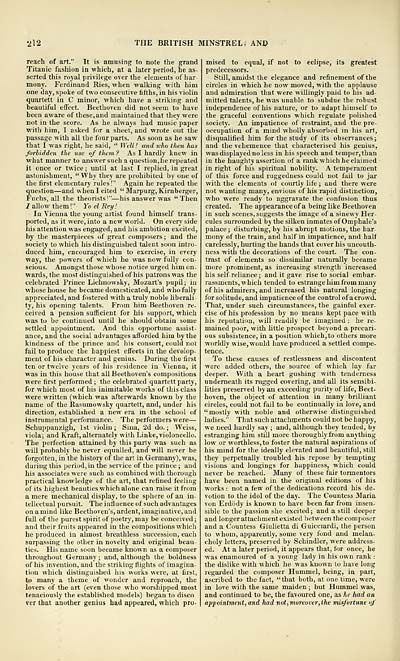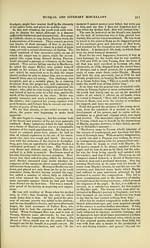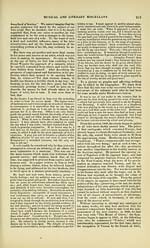Glen Collection of printed music > Printed music > British minstrel, and musical and literary miscellany
(220) Page 212
Download files
Complete book:
Individual page:
Thumbnail gallery: Grid view | List view

•212
THE BRITISH MINSTREL; AND
reach of art." It is amusing to note the grand
Titanic fashion in which, at a later period, he as-
serted this royal privilege over the elements of har
mony. Ferdinand Ries, when walking with him
one day, spoke of two consecutive fifths, in his violin
quartett in C minor, which have a striking and
beautiful effect. Beethoven did not seem to have
been aware of these, and maintained that they were
not in the score. As he always had music paper
with him, I asked for a sheet, and wrote out the
passage with all the four parts. As soon as he saw
that I was right, he said, " Well! and who then has
forbidden the use of them ? As I hardly knew in
what manner to answer such a question, he rejjeated
it once or twice ; until at last I replied, in great
astonishment, " Why they are prohibited by one of
the first elementary rules!" Again he repeated the
question — and w hen I cited " Blarpurg, Kirnberger,
Fuchs, all the theorists!" — his answer was "Then
/ allow them !" Yo el Rey!
In Vienna the young artist found himself trans-
ported, as it were, into a new world. On every side
his attention was engaged, and his ambition excited,
by the masterpieces of great composers ; and the
society to which his distinguished talent soon intro-
duced him, encouraged him to exercise, in every
way, the powers of which he was now fully con-
scious. Amongst those whose notice urged him on-
wards, the most distinguished of his patrons v»as the
celebrated Prince Lichnowsky, Mozart's pupil; in
whose house he became domesticated, and who fully
appreciated, and fostered with a truly noble liberali-
ty, his opening talents. From him Beethoven re-
ceived a pension sufficient for his support, which
was to be continued until he should obtain some
settled ajipointment. And this opportime assist-
ance, and the social advantages afforded him by the
kindness of the prince and his consort, could not
fail to produce the happiest effects in the develop-
ment of his character and genius. During the first
ten or twelve years of his residence in Vienna, it
was in this house that all Beethoven's compositions
were first performed ; the celebrated quartett party,
for which most of his inimitable works of this class
were written (which was afterwards known by the
name of the Rasumowsky quartett, and, under his
direction, established a new era in the school of
instrumental performance. The performers were —
Schuppanzigh, 1st violin ; Sina, 2d do. ; Weiss,
viola; and Kraft, alternately with Linke, violoncello.
The perfection attained by this party was such as
will probably be never equalled, and will never be
forgotten, in the history of the art in Germany), was,
during this period, in the service of the prince ; and
his associates were such as combined with thorough
practical knowledge of the art, that refined feeling
of its highest beauties which alone can raise it from
a mere mechanical display, to the sphere of an in-
tellectual pursuit. The influence of such advantages
on a mind like Beethoven's, ardent, imaginative, and
full of the purest spirit of poetry, may be conceived ;
and their fruits appeared in the compositions which
he produced in almost breathless succession, each
surpassing the other in novelty and original beau
tics. His name soon became known as a composer
throughout Germany ; and, although the boldness
of his invention, and the striking flights of imagina-
tion which distinguished his works were, at first,
to many a theme of wonder and reproach, the
lovers of the art (even those who worshipped most
tenaciously the established models) began to disco
ver that another genius had appeared, which pro-
mised to equal, if not to eclipse, its greatest
predecessors.
Still, amidst the elegance and refinement of the
circles in which he now moved, with the applause
and admiration that were willingly paid to his ad-
mitted talents, he was unable to subdue the robust
independence of his nature, or to adapt himself to
the graceful conventions which regulate polished
society. An impatience of restraint, and the pre-
occupation of a mind wholly absorbed in his art,
disqualified him for the study of its observances ;
and the vehemence that characterised his genius,
was displayed no less in his speech and temper, than
in the haughty assertion of a rank which he claimed
in right of his spiritual nobility. A temperament
of this force and ruggedness could not fail to jar
with the elements of courtly life ; and there were
not wanting many, envious of his rapid distinction,
who were ready to aggravate the confusion thus
created. The appearance of a being like Beethoven
in such scenes, suggests the image of a sinewy Her-
cules surrounded by the silken inmates of Omphale's
palace; disturbing, by his abrupt motions, the har-
mony of the train, and half in impatience, and half
carelessly, hurting the hands that cover his uncouth-
ness with the decorations of the court. The con-
trast of elements so dissimilar naturally became
more prominent, as increasing strength increased
his self reliance ; and it gave rise to social embar-
rassments, which tended to estrange him from many
of his admirers, and increased his natural longing
for solitude, and impatience of the control of a crowd.
That, under such circumstances, the gainful exer-
cise of his profession by no means kept pace with
his reputation, will readily be imagined : he re-
mained jjoor, with little prospect beyond a precari-
ous subsistence, in a position which, to others more
worldly wise, would have produced a settled compe-
tence.
To these causes of restlessness and discontent
were added others, the source of which lay far
deeper. With a heart gushing with tenderness
underneath its rugged covering, and all its sensibi-
lities preserved by an exceeding purity of life, Beet-
hoven, the object of attention in many brilliant
circles, could not fail to be continually in love, and
"mostly with noble and otherwise distinguished
ladies." That such attachments could not be hapjiy,
we need hardly say ; and, although they tended, by
estranging him still more thoroughly from anything
low or worthless, to foster the natural aspirations of
his mind for the ideally elevated and beautiful, still
they perpetually troubled his repose by tempting
visions and longings for happiness, which could
never be reached. Many of these fair tormentors
have been named in the original editions of his
works: not a few of the dedications record his de-
votion to the idol of the day. The Countess Maria
von Erdody is known to have been far from insen-
sible to the passion she excited; and a still deeper
and longer attachment existed between the composer
and a Countess Giulietta di Guicciardi, the person
to whom, apparently, some very fond and melan-
choly letters, preserved by Schindler, were address-
ed. At a later period, it appears that, for once, he
was enamoured of a young lady in his own rank :
the dislike with which he was known to have long
regaided the composer Hummel, being, in part,
ascribed to the fact, "that both, at one time, were
in love with the same maiden ; but Hummel was,
and continued to be, the favoured one, as he had an
appointment, and had not, moreover, the misfortune of
THE BRITISH MINSTREL; AND
reach of art." It is amusing to note the grand
Titanic fashion in which, at a later period, he as-
serted this royal privilege over the elements of har
mony. Ferdinand Ries, when walking with him
one day, spoke of two consecutive fifths, in his violin
quartett in C minor, which have a striking and
beautiful effect. Beethoven did not seem to have
been aware of these, and maintained that they were
not in the score. As he always had music paper
with him, I asked for a sheet, and wrote out the
passage with all the four parts. As soon as he saw
that I was right, he said, " Well! and who then has
forbidden the use of them ? As I hardly knew in
what manner to answer such a question, he rejjeated
it once or twice ; until at last I replied, in great
astonishment, " Why they are prohibited by one of
the first elementary rules!" Again he repeated the
question — and w hen I cited " Blarpurg, Kirnberger,
Fuchs, all the theorists!" — his answer was "Then
/ allow them !" Yo el Rey!
In Vienna the young artist found himself trans-
ported, as it were, into a new world. On every side
his attention was engaged, and his ambition excited,
by the masterpieces of great composers ; and the
society to which his distinguished talent soon intro-
duced him, encouraged him to exercise, in every
way, the powers of which he was now fully con-
scious. Amongst those whose notice urged him on-
wards, the most distinguished of his patrons v»as the
celebrated Prince Lichnowsky, Mozart's pupil; in
whose house he became domesticated, and who fully
appreciated, and fostered with a truly noble liberali-
ty, his opening talents. From him Beethoven re-
ceived a pension sufficient for his support, which
was to be continued until he should obtain some
settled ajipointment. And this opportime assist-
ance, and the social advantages afforded him by the
kindness of the prince and his consort, could not
fail to produce the happiest effects in the develop-
ment of his character and genius. During the first
ten or twelve years of his residence in Vienna, it
was in this house that all Beethoven's compositions
were first performed ; the celebrated quartett party,
for which most of his inimitable works of this class
were written (which was afterwards known by the
name of the Rasumowsky quartett, and, under his
direction, established a new era in the school of
instrumental performance. The performers were —
Schuppanzigh, 1st violin ; Sina, 2d do. ; Weiss,
viola; and Kraft, alternately with Linke, violoncello.
The perfection attained by this party was such as
will probably be never equalled, and will never be
forgotten, in the history of the art in Germany), was,
during this period, in the service of the prince ; and
his associates were such as combined with thorough
practical knowledge of the art, that refined feeling
of its highest beauties which alone can raise it from
a mere mechanical display, to the sphere of an in-
tellectual pursuit. The influence of such advantages
on a mind like Beethoven's, ardent, imaginative, and
full of the purest spirit of poetry, may be conceived ;
and their fruits appeared in the compositions which
he produced in almost breathless succession, each
surpassing the other in novelty and original beau
tics. His name soon became known as a composer
throughout Germany ; and, although the boldness
of his invention, and the striking flights of imagina-
tion which distinguished his works were, at first,
to many a theme of wonder and reproach, the
lovers of the art (even those who worshipped most
tenaciously the established models) began to disco
ver that another genius had appeared, which pro-
mised to equal, if not to eclipse, its greatest
predecessors.
Still, amidst the elegance and refinement of the
circles in which he now moved, with the applause
and admiration that were willingly paid to his ad-
mitted talents, he was unable to subdue the robust
independence of his nature, or to adapt himself to
the graceful conventions which regulate polished
society. An impatience of restraint, and the pre-
occupation of a mind wholly absorbed in his art,
disqualified him for the study of its observances ;
and the vehemence that characterised his genius,
was displayed no less in his speech and temper, than
in the haughty assertion of a rank which he claimed
in right of his spiritual nobility. A temperament
of this force and ruggedness could not fail to jar
with the elements of courtly life ; and there were
not wanting many, envious of his rapid distinction,
who were ready to aggravate the confusion thus
created. The appearance of a being like Beethoven
in such scenes, suggests the image of a sinewy Her-
cules surrounded by the silken inmates of Omphale's
palace; disturbing, by his abrupt motions, the har-
mony of the train, and half in impatience, and half
carelessly, hurting the hands that cover his uncouth-
ness with the decorations of the court. The con-
trast of elements so dissimilar naturally became
more prominent, as increasing strength increased
his self reliance ; and it gave rise to social embar-
rassments, which tended to estrange him from many
of his admirers, and increased his natural longing
for solitude, and impatience of the control of a crowd.
That, under such circumstances, the gainful exer-
cise of his profession by no means kept pace with
his reputation, will readily be imagined : he re-
mained jjoor, with little prospect beyond a precari-
ous subsistence, in a position which, to others more
worldly wise, would have produced a settled compe-
tence.
To these causes of restlessness and discontent
were added others, the source of which lay far
deeper. With a heart gushing with tenderness
underneath its rugged covering, and all its sensibi-
lities preserved by an exceeding purity of life, Beet-
hoven, the object of attention in many brilliant
circles, could not fail to be continually in love, and
"mostly with noble and otherwise distinguished
ladies." That such attachments could not be hapjiy,
we need hardly say ; and, although they tended, by
estranging him still more thoroughly from anything
low or worthless, to foster the natural aspirations of
his mind for the ideally elevated and beautiful, still
they perpetually troubled his repose by tempting
visions and longings for happiness, which could
never be reached. Many of these fair tormentors
have been named in the original editions of his
works: not a few of the dedications record his de-
votion to the idol of the day. The Countess Maria
von Erdody is known to have been far from insen-
sible to the passion she excited; and a still deeper
and longer attachment existed between the composer
and a Countess Giulietta di Guicciardi, the person
to whom, apparently, some very fond and melan-
choly letters, preserved by Schindler, were address-
ed. At a later period, it appears that, for once, he
was enamoured of a young lady in his own rank :
the dislike with which he was known to have long
regaided the composer Hummel, being, in part,
ascribed to the fact, "that both, at one time, were
in love with the same maiden ; but Hummel was,
and continued to be, the favoured one, as he had an
appointment, and had not, moreover, the misfortune of
Set display mode to: Large image | Transcription
Images and transcriptions on this page, including medium image downloads, may be used under the Creative Commons Attribution 4.0 International Licence unless otherwise stated. ![]()
| Special collections of printed music > Glen Collection of printed music > Printed music > British minstrel, and musical and literary miscellany > (220) Page 212 |
|---|
| Permanent URL | https://digital.nls.uk/91437585 |
|---|
| Description | Scottish songs and music of the 18th and early 19th centuries, including music for the Highland bagpipe. These are selected items from the collection of John Glen (1833 to 1904). Also includes a few manuscripts, some treatises, and other books on the subject. |
|---|
| Description | The Glen Collection and the Inglis Collection represent mainly 18th and 19th century Scottish music, including Scottish songs. The collections of Berlioz and Verdi collected by bibliographer Cecil Hopkinson contain contemporary and later editions of the works of the two composers Berlioz and Verdi. |
|---|

